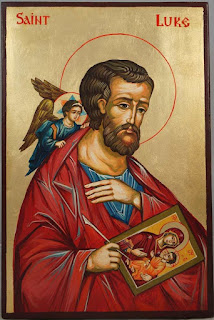Reflection for the Feast of St Luke
We all, I am sure, have our favourite Gospel. For some it will be Matthew, where Jesus is the man of the fulfilment of history and Biblical prophecy, one in whom the pieces of the of the Old Testament jigsaw come to fulfilment. Others will favour St Mark, with his action packed, breathless life of Jesus, where Jesus only stops to pray, eat, or sleep. Then there is the mystical Gospel of St John which links eternity with human history, a gospel in which earth reached up to touch heaven, and heaven reaches down to earth.
My favourite
Gospel is that of St Luke. I like Luke because he is a compassionate storyteller.
The Jesus we meet in Luke’s Gospel wis one who links human life into the story
of God. From Luke we get our best loved parables, those of the Lost Son (the
Prodigal) and the Good Samaritan, stories of a God who comes alongside us when
we are in need. A God who hitches up the skirts of his robe and rushes out to
meet us with joy, even when we feel at our worst.
But Luke’s is
also a radical gospel, which is another reason why I favour it. In Luke we hear
the story of Lazarus and the rich man (Luke 16.19-31), where the presumptions
of the rich and powerful are overturned, and a man once rich in power comes to
realise that he can no longer order the poor man who slept by his gate around.
We also meet a Jesus whose inner circle includes women (Luke 8.1-3). Likewise
we hear Mary sing of a radical God who overthrows the earthly powers in the
Magnificat (Luke 1.46-55), and a mother who takes charge in place of her more
powerful but now miraculously silenced husband (Luke 1.59-63). All of this is a
reminder that Luke’s friend and companion St Paul is far from being the sexist
that we sometimes assume him to be. (If you’d like to find out more about
Paul’s views on women as read through the lens of 1 Corinthians, then do join
our Bible Study on Wednesday of this week.)
As I have said, St
Luke was a companion of St Paul on some of his evangelistic journeys, the
stories of which he recounts in his Acts of the Apostles. Former Archbishop of
Canterbury Rowan Williams has said that Luke, a doctor by trade may have
accompanied Paul in order to help him with his medical difficulties (his ‘thorn
in the flesh’, 2 Corinthians 12.7-9), which may have included an ongoing an
painful eye condition. But Luke is more than just a doctor of the body, he is
also a doctor of the soul as the Collect for his feast day puts it. And if St
Luke is a doctor of the soul, then much more so is Jesus, in particular the
Jesus we meet in his gospel.
In the Gospel of
St Luke, we find a God who comes alongside the suffering, who rejoices when
what is lost is returned, whether it’s a coin, sheep or son. In this he is the
one we need in our current situation, marked as it is by ongoing lockdowns and the
significant risk of infection and illness represented by Covid-19. But the
Jesus of Luke isn’t just one who comes alongside and comforts us, he also
challenges the assumptions of the time about the place of women and the poor in
the Kingdom of God, and he reminds us of the place of the powerless in the
economy of the Kingdom of God. A message we need to hear ever more clearly, and
which we need to live out in our own lives as we are reminded that Black Lives
Matter and have always mattered, even if society has not always been willing to
say so.
So which ever
your favourite Gospel is, let us give thanks to God today for St Luke, a true
Doctor of the Soul whose Gospel reveals a Jesus who comes alongside us in our
weakness, and who turns on their head our assumptions about power and leadership.




Comments
Post a Comment